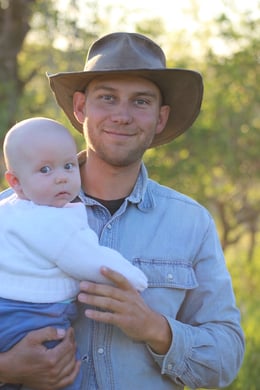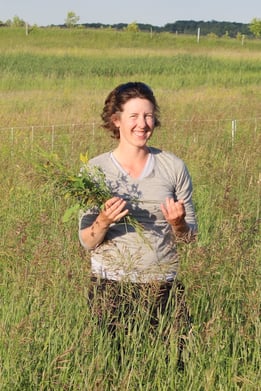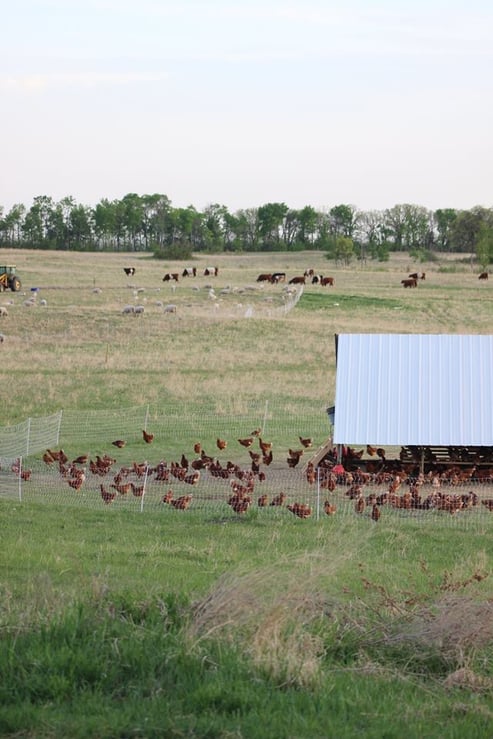Photos: Luna Field Farm
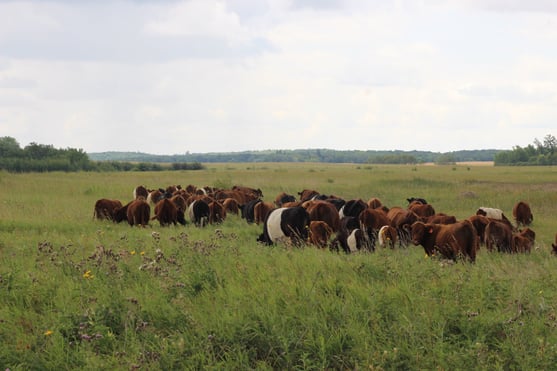
How Lydia Carpenter and Wian Prinsloo got to farm ownership, nearly a decade after they started their grazing and regenerative meat business.
Our good friends Lydia Carpenter and Wian Prinsloo are the owners of Luna Field Farm near Belmont, Manitoba. Neither of them grew up with a family farm, but were deeply committed to farming as a career since their 20s. They knew they wanted to farm, but had no clear picture how they would work their way into owning land.
Fast forward a decade, and they have built their way from renting pastures, to rolling three-year leases, to owning their own farm in a succession agreement nearly a decade after they started their business.
Part I: Advice to Young Farmers From Luna Field Farm reposted from our blog in 2016. It starts with building a small, portable business to take advantage of leases. Stay tuned for Part II on a deep dive of how they made farm ownership work.
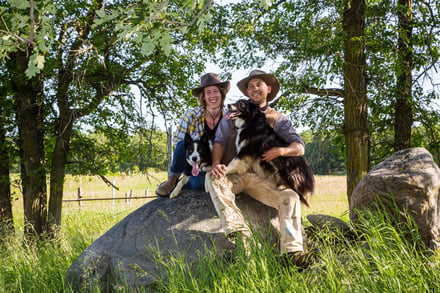
Lydia Carpenter and Wian Prinsloo are the owners of Luna Field Farm on the Manitoba prairie. They raise pastured chickens for eggs and meat, a “flerd” of sheep and cattle, pastured pigs, and goats, and direct market to customers in Winnipeg. Lydia and Wian are professional graziers – growing healthy grass is the foundation of their business. They move the chickens and flerd every day on pasture and bring pigs into their rotation to build soil health.
We talked to them in 2016, in the 5th year of running a growing business in the local Manitoba community. Lydia had lots of advice for young farmers just starting out, lessons learned through trial and error.
Wian and Lydia both grew up city kids, but have loved farming and worked over the years to build their farming business into a viable profession. Wian grew up in South Africa and has been farming on rented land since the age of 18 during his summers. Lydia studied soil and nutrient cycling at the University of Winnipeg, and earned a Master’s in Natural Resources Management with a research focus on rural livelihoods and gender.
Advice to other young farmers
- Start small. Don’t expand beyond what you can afford to lose. Don’t try to get big too fast.
- Make your business portable. Everyone thinks about buying land first – don’t. We rent land and plan to buy someday, but everything on our farm from broiler pens, water tanks, and fence can be moved on a trailer. I could pick up the farm and move it in a weekend, and we've had to a couple times! We made everything portable, even the brand.
- Keep debt to a minimum. Don’t saddle the operation with so much debt you can’t ride out the hard times – you’ll make mistakes, and those tough times will come!
- Focus on profit, not payments. Most farmers think about whether you can make things work enough to make payments. You need to think about making profits and how much you can be putting away each year to meet your goals.
- Own and control your business. Be careful of outside interests in your company. Investors giving you extra capital to expand quickly may sound great, but they might have different views on your business. Make sure you control your operation and have freedom to run things the way you want. Watch that 51st share carefully.
- Use professionals to leverage your time. Value your time! Our accountant pays for herself and then some. We think of it as money well spent on what we DON’T love, so that we can spend more time on the part of the business we DO love. Also, if you have a business partner, make sure your legal will is in order. Once you’ve been at it for several years, and there’s something to lose in case something happens to one of you, make sure you’re protecting your partner.
- You have to really love what you do. There are going to be ups and downs, and really hard times. Make sure you are doing what you love. Lydia says she asks Wian every day, “Are you happy?”
- Ignore the naysayers. Just ignore them. Don’t waste time thinking about them, build your business.
- The people who will support you aren’t always the ones you expect. Don’t underestimate the power of work ethic and honesty in what you’re doing. We have neighbors who might not farm the same way, but they watch what we do. They watch to see if you get out every day to do your chores, if you call when there’s a storm to check on them, and if you’re working hard and really trying to make it. They're the ones who will help you out when you really need it.
Note: On the Manitoba prairie, Luna Field Farm had to contend with hailstorms, tornadoes, sometimes destroying infrastructure or flipping over their chicken coop. More details in the next Real Talk Part II post.
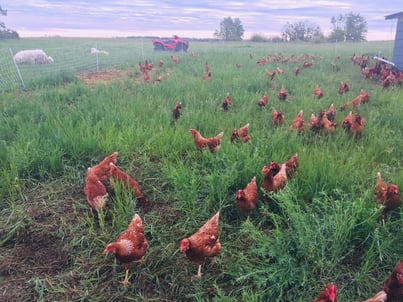
 Advice on renting land for new farmers
Advice on renting land for new farmers- If you want to get good land, don’t wait for it to be on a public list. Everyone complains about how no land is on the market, but land is changing hands all the time. If I had land, I wouldn’t want to rent it to somebody I don’t know. By the time it hits the public markets, or a broker, either someone is looking to get as much money as they can from the transaction. That can be a valid reason to – but you know that liquidity is the main objective. Or else they don’t have great community relationships, which should be a red flag for you. If the land is well managed and known in the community, then it’s not going to show up in those places.
- Build your community relationships. If you think you know where you want to live, move to rural communities a year or two before you look for land and build your relationships. Work on someone else’s land, get to know your neighbors, and get on closed mailing lists.
- Choosing landlords. It’s not always great to partner with a landlord who has a lot of opinions – they tend to want to micromanage your business. Ideally, find a landlord who doesn’t want to farm but is happy that you’re increasing the land asset value and productivity for them as a grazing manager.
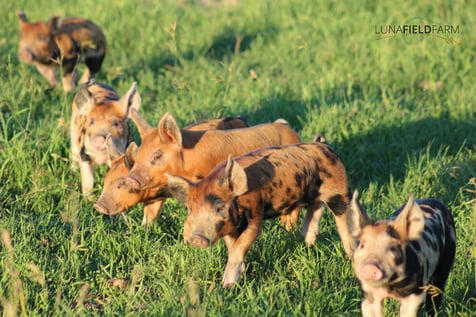
Marketing advice
- Be a professional. That means showing up knowledgeable, cleanly dressed, articulate, competent. Don’t expect handouts. Be an expert in your trade. Run your business like a business.
- Expect competence from your customers too. Engage them at an intellectual level. Lydia wrote about grazing and the rumen microbiome in her newsletter – pretty deep into the science! A customer who was an microbiologist loved it and started up a deeper relationship with the farm.
- What do customers most like to hear? “I’m a real farmer. I grew this food.” Invite them out to see the farm and how you do things.
Note: a few years ago, animal rights activists staged an online group attack with 0 star ratings and abusive posts, on Luna Field Farm's Facebook page. Hundreds of Lydia and Wian's customers flooded to their Facebook page and helped defend Luna Field Farm's animal welfare and farming practices. Their rating is still 4.9 stars today.
- Don’t be afraid to make money. It’s nice to do what you love, but even more fun when you’re getting paid for it! Doing what you love is great, but not as great if you are working for free, or worse – paying to work. You’re running a business. We believe in customers paying well for a product with integrity, using currency as a value for building community.
- Make technology work for you. Lydia built a strong customer following for the farm on Facebook by taking photos around the farm, and has conversations with customers through their website. She bartered with friends to design Luna Field Farm’s logo and website. Customers sign up and order using EmailMeForm. She uses Mailchimp for her mailing list.
- Live well and simply. I will buy one good item of things that are important – I think of myself as an athlete that needs to put on armor every day, out on the prairie with the big winds and snows, and make sure I am wearing what I need to do my job. I spend on good socks and good boots, and merino wool. Eat well. Take care of your body as well as you can. It is your best machine and best investment. We are frugal, but we spend our money well. We eat plenty of protein from our farm – eggs, goat milk, goat cheese, beef and lamb in the freezer. We pay our farmer friends well for great vegetable products they produce. We eat great food here.
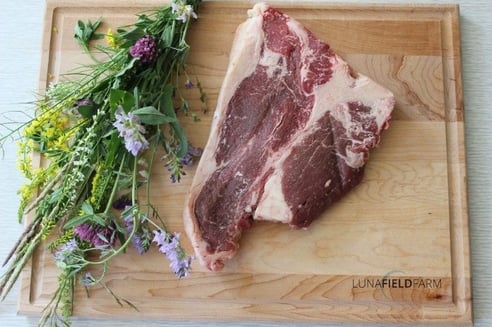
Why do you do what you do? We started Luna Field Farm because we love what we do, and we want to eat good food ourselves. This is the kind of food we believe in. It’s not that we saw this market niche and wanted to “take advantage of it”. This is food raised with integrity, that reflects our values. We’re building a community, building a relationship business. And as two kids who didn’t grow up on land our families own, we had to be very intentional about building the business and our lifestyle from scratch. But we also want to show that farming is a viable livelihood and a profession where you can live well and do what you love.
